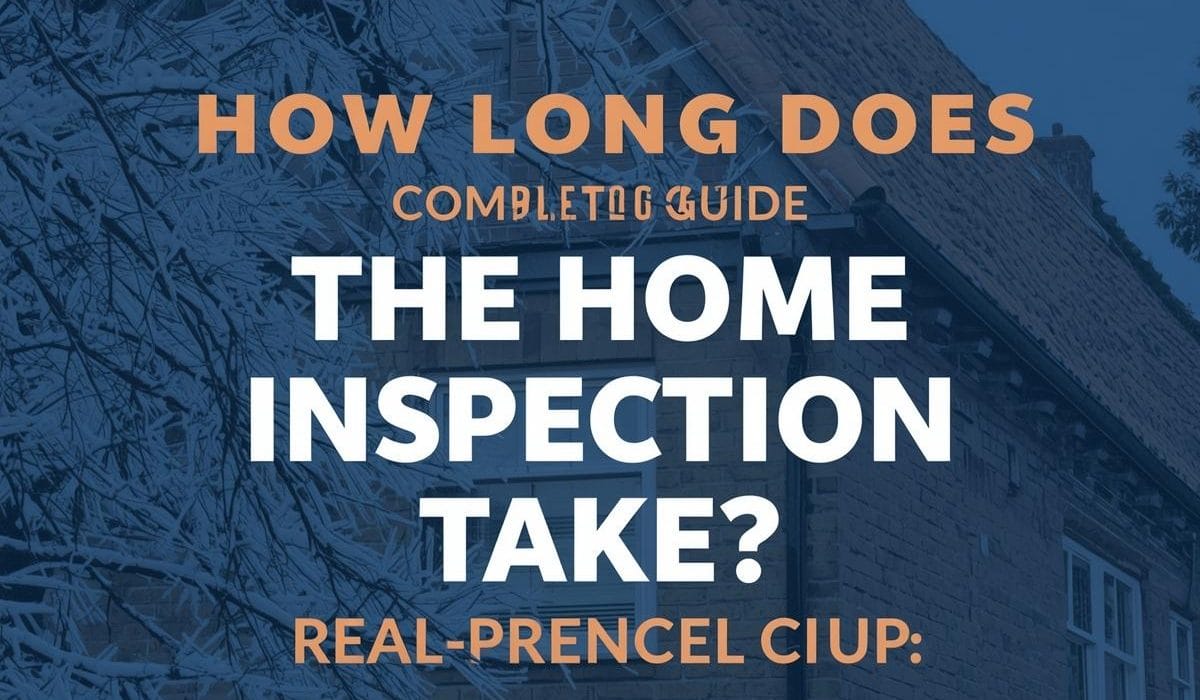Introduction
A typical home inspection takes 2 to 4 hours for a standard single-family house.
Smaller homes or condos may take ~1 to 1.5 hours; larger, older, or complex houses can require 3.5+ hours.
Additional time is often spent on final walkthrough and report writing.
If you’re buying a house, one of your biggest questions will be: how long will the home inspection take? It’s more than just a checkbox — the inspection is your chance to discover hidden issues, avoid surprises, and negotiate repairs. You deserve a clear answer, backed by real experience and data.
In this guide, you’ll learn:
- What the typical time ranges are
- What factors stretch or shorten inspections
- What real inspectors say from the field
- Tips for buyers, sellers, and agents
- A concise snippet for quick answer
- FAQs to cover what users search
Let’s dig in.
Typical Duration vs Reality
Many of your competitor sources (HomeGauge, Carson Dunlop, ListWithClever) report that a standard home inspection for an average-sized house takes between 2 and 4 hours.
For example:
- HomeGauge notes that a 2,000 sq ft home often takes 3–4 hours.
- Carson Dunlop says “on average, a standard home inspection takes between 2 to 4 hours.”
- ListWithClever states “a home inspection typically takes 2–3 hours” for most homes.
- The Spruce mentions 2–3 hours for one inspector, or as little as 90 minutes when two inspectors collaborate.
These are good benchmarks, but they are just averages. Real time often differs depending on property specifics.
What Affects How Long the Inspection Takes
To understand the true length, you must know what variables drive inspection time. Below is a table summarizing key factors and their impact, followed by detailed explanation.
| Factor | Effect on Time | Why / Example |
| Size of house (sq ft / rooms) | Larger houses take longer | More rooms, systems, walk areas |
| Age & condition | Older homes / repairs = slower | More defects, harder to access |
| Accessibility | Tight crawlspaces, locked areas slow it | Inspector must navigate carefully |
| Number of systems & features | More HVAC units, pools, outbuildings multiply tasks | Each system adds inspection steps |
| Additional services (mold, radon, septic) | Add 10–60+ min depending on service | These are extras beyond base inspection |
| Buyer participation & questions | If buyer follows and asks, slows pace | Conversational detours add time |
| Report writing on site vs after | Reporting on site adds to inspection time | Some inspectors document during the inspection |
Detailed Explanation
- Size & Layout: A 1,500 sq ft home with 2 bathrooms is much quicker than a 5,000 sq ft home with multiple wings, basements, or attic space.
- Age & Condition: Older homes often have deferred maintenance, hidden issues, or modifications. That means the inspector is stopping more often, taking more photos, and checking more subsystems.
- Accessibility: If the attic is hard to reach, or the crawlspace is cramped, the inspector must move slowly and carefully, increasing inspection time.
- Extra Systems: Things like septic systems, outbuildings, pools, or detached garages add tasks. If the buyer asks for mold or radon tests, that’s extra time.
- Buyer Interactions: If you walk with the inspector, ask questions in real-time, or slow them down, the process lengthens — though it adds value.
- On-Site Reporting: Some inspectors complete parts of their report on site (photos, notes), while others delay writing until later. Doing more on site adds to the inspection duration.
Real Inspectors Speak: Field Experience
It’s one thing to quote rules; it’s more powerful to hear from active inspectors.
- In InterNACHI forums, professionals commonly say “2.5 to 4 hours depending on many factors.”
- One inspector explained that doing an inspection in less than 1.5 hours often means minimal sampling — not a thorough job.
- Another noted: for a 2,000 sq ft “move-in ready” home, expect about 2.5 hours (including 10 minutes of summary with client).
- On busy forums, many inspectors set 1.5 hours base for first 1,000 sq ft, then add 30 minutes for each additional 500 sq ft.
- Some also separate “on site” time and “report writing time,” e.g. 2 hours on site + 1 hour writing.
These real-world inputs validate the 2–4 hour range, while emphasizing variability.
📏 Estimated Duration by House Size
Here’s a useful table you can use in your article to help readers estimate:
| House Size / Type | Estimated Inspection Time | Notes |
| < 1,000 sq ft / small condo | 1.0 – 1.5 hours | Fewer systems, fewer rooms |
| 1,000 – 2,000 sq ft | 1.5 – 2.5 hours | Standard single-family property |
| 2,000 – 3,000 sq ft | 2.5 – 3.5 hours | Larger footprint, more features |
| 3,000+ sq ft or custom home | 3.5+ hours | Complex systems, more coverage |
| Historic / older / many additions | + 30–60 minutes | More details, checks, surprises |
Explanation:
If you own a 1,500 sq ft typical house, you can reasonably expect around 2 to 2.5 hours. But if your home is larger, older, or more complex, budget in more time. Always leave a buffer.
Typical Phases and Time Allocation
Here’s a rough breakdown of how the inspection time is spent this helps readers understand what’s happening during those hours.
- Exterior & Grounds – 15-30 minutes
- Roof, Gutters, Chimney – 10-20 minutes
- Interior Rooms (floors, walls, doors) – 20-40 minutes
- Mechanical Systems (plumbing, HVAC, electrical) – 20-40 minutes
- Attic / Insulation / Crawlspace / Basement – 15-30 minutes
- Final summary & walk-through with client – 10-15 minutes
- Report writing / photo capture (on site) – part concurrent
Because inspectors often take photos, make notes, check behind walls, and consult tools, these phases overlap but knowing approximate splits helps manage expectations.
Tips for Buyers, Sellers and Agents
To make the inspection smoother, faster, and more informative:
- Prepare access: Clear pathways, unlock utility rooms, open attics/crawlspaces
- Turn on utilities: Have HVAC, water, lights, and appliances working before inspection
- Provide floor plan / history: Share prior reports or renovations so inspector knows where to focus
- Limit interruptions: Avoid shadowing the inspector too closely or asking too many questions mid-inspection — save it for walk-through
- Ask for a buffer: Schedule 3–4 hours even if estimate says 2 hours — better safe than rushing
- Choose a qualified inspector: One with credentials, good reviews, and thoroughness will deliver value, even if they take a little more time
These practices not only speed things up — they improve the quality of the inspection outcome.
Conclusion & Takeaways
- The typical home inspection lasts between 2 and 4 hours for a standard house — that’s your baseline.
- Smaller homes may take ~1 to 1.5 hours; larger or complex ones may require 3.5+ hours.
- Inspection time hinges on size, age, condition, accessibility, and additional services.
- Buyers should arrive for the final walk-through and allow buffer time.
- A thorough, uncompromised inspection is worth a bit more time — it gives confidence in one of your largest investments.
If you like, I can tailor this to your local market (e.g. in Pakistan) and include local inspection standards, pricing, and expectations. Do you want me to adapt for your region next?
Frequently Asked Questions (FAQs)
Q1. Is 1 hour enough for a home inspection?
No. A one-hour inspection is very unlikely to uncover all issues. Most professionals consider 1.5 hours or less too short for a thorough inspection.
Q2. Does the buyer have to be present?
Not necessarily — but being present helps you see issues firsthand, ask questions, and better understand the report. Many inspectors welcome your presence for the last 10–15 minutes.
Q3. When will I get the inspection report?
Most inspectors deliver the written, photo-enabled report within 24 to 48 hours after the inspection. Some produce parts of it on site.
Q4. What if the home is vacant or under renovation?
Vacant homes often take less time, since no occupant interference exists. Homes under renovation may take longer, due to unknown wiring, partial finishes, and hidden systems.
Q5. Can additional services stretch the time?
Yes adding mold testing, radon, septic, sewer scope, or other specialty inspections can add 10 to 60+ minutes depending on the service and property.
Q6. Why do some inspections last 5+ hours?
Large luxury homes, multiple buildings, old properties, or ones with many defects can push inspections to 5+ hours. Inspectors emphasize doing the job right, not rushing.







